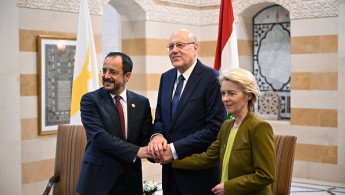EU announces US$1 billion in aid to Lebanon in bid to curb migration
EU Chief Ursula von der Leyen announced US$1 billion in aid to Lebanon over the next three years during a visit to Beirut aimed at curbing the number of irregular migrants travelling to Europe via boat.
Von der Leyen said that the aid was aimed at bolstering social services such as education and healthcare while stressing that Lebanon needed to reform to exit its 5-year economic crisis. It would also include assistance to Lebanon's armed forces.
"I can announce a financial package of US$1 billion for Lebanon that would be available from this year until 2027. We want to contribute to Lebanon's socioeconomic stability," von der Leyen said.
She added that while the EU would maintain legal pathways for migrants wanting to settle in the EU, the bloc was "counting on [Lebanon's] good cooperation to prevent illegal migration and combat migrant smuggling."
The announcement was made during a joint meeting with Cypriot President Nikos Christodoulides, who had visited Lebanon just three weeks earlier.
The aid package was criticised by rights activists who pointed to the Lebanese army's record of deporting Syrians without due process and in violation of the principle of non-refoulement. Human Rights Watch on 25 April condemned what it said was "repression" of Syrians by Lebanese authorities.
Rights groups have consistently said that Syria is not yet for returns, pointing to documented instances of regime authorities arbitrarily detaining, torturing, and even killing returnees.
Cyprus overwhelmed
Cyprus has, for months, called on the EU to increase its funding for Lebanon to help it police its maritime borders. The number of migrants heading to Cyprus from Lebanon and Syria has risen sharply, with the island recording a 27-fold increase in migration compared to the previous year.
Migration from Lebanon, in particular, has jumped as weather conditions make the journey more accessible, and anti-Syrian xenophobia has pushed Syrian refugees to seek refuge in Cyprus.
Cypriot authorities have pointed to Israel's war in Gaza as an impediment to Lebanon's ability to patrol its own shores.
Cyprus had a 2020 bilateral agreement that allowed it to return migrants from Lebanon, but in February, Lebanese authorities stopped accepting return requests from Cyprus.
Lebanon has said that it can no longer shoulder the burden of the around 1.2 million Syrians it has hosted since the beginning of Syria's revolution turned civil war in 2011.
Anti-Syrian rhetoric exploded in the country after a Christian Lebanese Forces politician was killed on 8 April by what the Lebanese army said was a group of Syrians.
Incidents of groups of men beating Syrians in the streets have increased alongside calls from Lebanese politicians to create a plan to return Syrians to their country.
Lebanese Caretaker Prime Minister Najib Mikati said that after his meeting with von der Leyen, he "refuses to turn Lebanon into an alternative homeland" for refugees and called on the EU to encourage Syrians to go back to Syria.
In April, Cypriot boats began to patrol Lebanon's coast to intercept boats carrying migrants before they reached Cyprus.
Lebanese media reported that Cyprus's Coast Guard had turned back five boats on 19 April, with migrants accusing Cypriot authorities of mistreating and forcibly pushing them back to Lebanon.
"I am confident that this package that we are announcing today will enhance the ability of the Lebanese authorities to face various challenges, including controlling land and sea borders," President Christodoulides said.




 Follow the Middle East's top stories in English at The New Arab on Google News
Follow the Middle East's top stories in English at The New Arab on Google News


![A group of Palestinians, foreign and Israeli activists gather to participated in an olive picking event on the land in the town of Battir, which is under threat of confiscation by Israel in Bethlehem, occupied West Bank on 8 November 2024. [Getty]](/sites/default/files/styles/image_330x185/public/2182930803.jpeg?h=199d8c1f&itok=__0LgGsa)